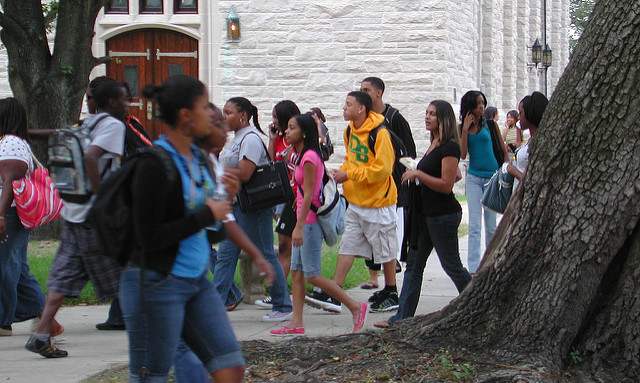Understanding the Historical Roots of Today’s Public Education

Public education in America has a history as old as the country itself. With the close of the Revolutionary War and national rhetoric focusing on equality and independence, the late 18th century saw a lot of work put into the development of public schools, thus laying the foundations for the system we now have today.
A distinct move toward public education was supported by the Northwest Ordinance of 1787. In 1820, Congress authorized the collection of state education funds from the sale of public lands. These ordinances paved the way for land to be set aside for public schools.
Social support for a common or publicly funded school also grew, emanating from a number of sectors across society. As the Industrial Revolution took hold, national demographics shifted. More people left rural areas for urban centers where they could find jobs. A substantial working class was evolving, one that was more demanding and wanted to see their children educated. Others, in particular the more elite of society, saw the existence of a common school as an opportunity for social control. School would be a place where all children could be taught middle-class behaviors and values and how to become contributors to society when they reached adulthood. Professional educators also supported a common school through articles in educational journals and through the influence of their organizations. The convergence of support from these disparate voices, along with the dedication and continuous efforts of education reformers, eventually led to the system of mass public education supported by public funds that we know today.
The progressive education movement paved the way for significant education reforms. The movement began in the 1880s and has persisted in various forms to the present. Proponents of progressive education stressed the emotional, artistic, and creative aspects of human development. The movement emphasized learning by doing and the creation of curricula to suit children’s interests. This was a departure from previous educational approaches, in which the interests of children mattered very little. John Dewey was a principal proponent and supporter of the movement. He proposed new ways of thinking about education that emphasized pragmatism rather than reliance on moral and religious principles. This new way of thinking about education included educational theories based on scientific models, which paved the way for a more secular approach to education.
Support for public school did not end at the elementary and secondary levels. Support for public postsecondary education was initiated when the first Morrill Act passed in 1862. This act granted land to each state, based on the number of senators and representatives in the state, for colleges to be built that focused on agriculture and the mechanical arts. The second Morrill Act was enacted 28 years later, in 1890. This act provided monetary support for colleges that were built as a result of land grants. For states to be eligible for grant funds under the Morrill Act of 1890, they had to provide evidence that race was not a factor in admissions to the public college, or provide land so that an institution for students of color could be built. Many historically African American colleges and universities were an outcome of this requirement, as some states opted to keep the races separated and build separate land-grant colleges for European American and African American students. “Separate but equal” policies persisted until the 20th century.
Public schooling has always been present, if not exactly as it looks now. The public education system has made leaps and bounds in terms of embracing the equal opportunity envisioned for it by its founders – and it’s up to today’s teachers to keep the momentum of change going.






